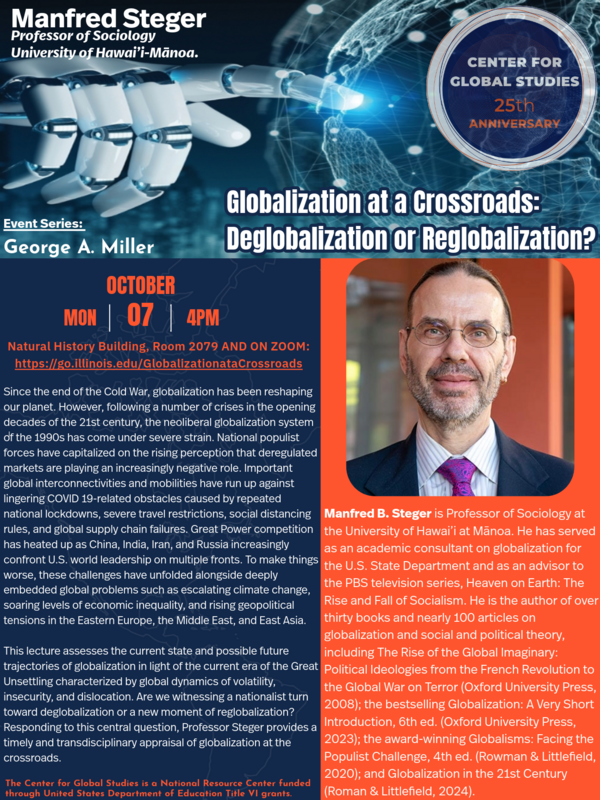
"Globalization at a Crossroads: Deglobalization or Reglobalization?"
- Event Type
- Lecture
- Sponsor
- Center for Global Studies
- Location
- 2079 Natural History Building
- Virtual
- Join online
- Date
- Oct 7, 2024 4:00 pm
- Speaker
- Manfred B. Steger is Professor of Sociology at the University of Hawai’i at Mānoa. He has served as an academic consultant on globalization for the U.S. State Department and as an advisor to the PBS television series, Heaven on Earth: The Rise and Fall of Socialism. He is the author of over thirty books and nearly 100 articles on globalization and social and political theory, including The Rise of the Global Imaginary: Political Ideologies from the French Revolution to the Global War on Terror (Oxford University Press, 2008); the bestselling Globalization: A Very Short Introduction, 6th ed. (Oxford University Press, 2023); the award-winning Globalisms: Facing the Populist Challenge, 4th ed. (Rowman & Littlefield, 2020); and Globalization in the 21st Century (Roman & Littlefield, 2024).
- Views
- 211
- Originating Calendar
- Center for Global Studies: Events
Since the end of the Cold War, globalization has been reshaping our planet. However, following a number of crises in the opening decades of the 21st century, the neoliberal globalization system of the 1990s has come under severe strain. National populist forces have capitalized on the rising perception that deregulated markets are playing an increasingly negative role. Important global interconnectivities and mobilities have run up against lingering COVID 19-related obstacles caused by repeated national lockdowns, severe travel restrictions, social distancing rules, and global supply chain failures. Great Power competition has heated up as China, India, Iran, and Russia increasingly confront U.S. world leadership on multiple fronts. To make things worse, these challenges have unfolded alongside deeply embedded global problems such as escalating climate change, soaring levels of economic inequality, and rising geopolitical tensions in the Eastern Europe, the Middle East, and East Asia. This lecture assesses the current state and possible future trajectories of globalization in light of the current era of the Great Unsettling characterized by global dynamics of volatility, insecurity, and dislocation. Are we witnessing a nationalist turn toward deglobalization or a new moment of reglobalization? Responding to this central question, Professor Steger provides a timely and transdisciplinary appraisal of globalization at the crossroads.